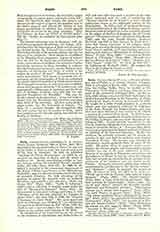
Alexis-Paulin Paris
Philologist, b. at Avenay, Marne, France, March 25, 1800; d. Feb. 13, 1881

Paris, ALEXIS-PAULIN, philologist, b. at Avenay, Marne, France, March 25, 1800; d. February 13, 1881. Having finished his classical studies at Reims, he was sent by his father to Paris to study law, but devoted most of his time to literature. In 1824 he published “Apologie de l’Ecole Romantique”, in which he advocated the imitation of Byron and the study of medieval art. Besides contributing articles to various literary reviews, he translated Byron’s complete works (13 vols., Paris, 1827-32). In 1828 he obtained a clerkship in the manuscript department of the King’s Library (now known as the Bibliotheque Nationale), and was afterwards promoted to the rank of assistant librarian. He took advantage of his position to pursue his research work on medieval literature, and publish a few old epics, “Berte aux Grans Piés” (Paris, 1831), “Garin le Loherain” (1835), and a collection of popular songs under the title of “Romancero Francais” (Paris, 1833). He then turned to historical writings, publishing in 1833 “Mèmoire sur la Relation Originale des Voyages de Marco Polo“, and from 1836 to 1840, the “Grandes Chroniques de Saint Denis”. His most important work as a librarian, was his book on “Les Manuscrits Francais de la Bibliothèque du Roi” (Paris, 1836-48), which is not a mere catalogue, but a lengthy dissertation on the authors and contents of the MSS. In recognition of his achievements, he was elected to the Academy of Inscriptions and Belles-lettres in 1837 and soon after was made a member of the committee entrusted with the task of continuing the “Histoire littéraire de la France,” a most valuable publication, begun in the eighteenth century by the Benedictines. In 1853 a chair of medieval literature was created for him in the College de France, and for nineteen years he lectured in a most scholarly manner on the origins of the French language, the old French epics or “Chansons de Geste”, the novels of the Round Table, and the early French theatre. Medieval literature appealed to him, because he found in it a naive but strong expression of his religious faith. Busy as he was with the preparation of his lectures, he found time to publish, with dissertations and annotations, such works as “Historiettes de Tallemand des Réaux” (9 vols., Paris, 1860), “Aventures de Maitre Renart et d’Ysengrin” (Paris, 1861), “Recueil cornplet des Poèmes de St-Pavin” (1861), “Romans de la Table Ronde” (1868-77), “Le Livre du Voir Dit”, by Guillaume de Machault (1867). He resigned his chair in the Collège de France in 1872.
LOUIS N. DELAMARRE

